
Hutton Roof Crags is a hill in south-eastern Cumbria in north-west England, located near to the village of Hutton Roof. It has extensive areas of limestone pavement as well as grassland and woodland. The hill forms the Hutton Roof Crags Site of Special Scientific Interest and is part of the Morecambe Bay Pavements Special Area of Conservation. A significant proportion of the UK's 20 km2 (7.7 sq mi) of limestone pavement is to be found on Hutton Roof Crags and the neighbouring Farleton Knott.
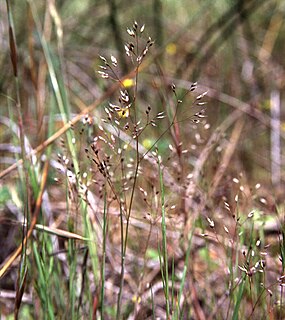
Aira is a genus of Old World plants in the grass family, native to western and southern Europe, central and southwest Asia, plus Africa.

Molinia caerulea, known by the common name purple moor-grass, is a species of grass that is native to Europe, west Asia, and north Africa. It grows in locations from the lowlands up to 2,300 m (7,546 ft) in the Alps. Like most grasses, it grows best in acid soils, ideally pH values of between 3.5 and 5, however, it can continue to live under more extreme conditions, sometimes to as low as 2. It is common on moist heathland, bogs and moorland throughout Britain and Ireland. Introduced populations exist in northeastern and northwestern North America.

The Scotch argus is a butterfly of the family Nymphalidae. In spite of its English name argus, it is not a close relation of the brown argus nor the northern brown argus.
This article gives an overview of the calcicolous grassland communities in the British National Vegetation Classification system.

Hordeum pusillum, the little barley, is an annual grass native to the United States. It arrived via multiple long-distance dispersals of a southern South American species of Hordeum about one million years ago. Its closest relatives are therefore not the other North American taxa like meadow barley or foxtail barley, but rather Hordeum species of the pampas of central Argentina and Uruguay. It is less closely related to the Old World domesticated barley, from which it diverged about 12 million years ago. It is diploid.

Cynosurus is a genus of Eurasian and North African plants in the grass family. Plants in this genus are known generally as dogstail grass. They are native to the Mediterranean Basin and neighboring regions, but some have been introduced into Australia as well as North and South America.
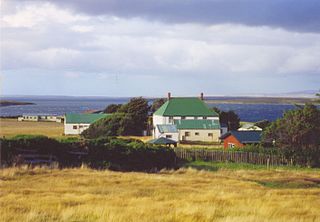
Tussock grasses or bunch grasses are a group of grass species in the family Poaceae. They usually grow as singular plants in clumps, tufts, hummocks, or bunches, rather than forming a sod or lawn, in meadows, grasslands, and prairies. As perennial plants, most species live more than one season. Tussock grasses are often found as forage in pastures and ornamental grasses in gardens.
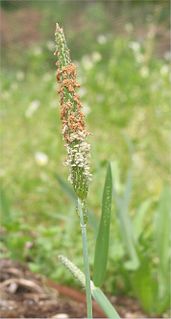
Alopecurus geniculatus is a species of grass known by the common name water foxtail or marsh foxtail. It is native to much of Eurasia and introduced into North America, South America, and Australia. It grows in moist areas.

Sesleria is a Eurasian and North African genus of perennial plants in the grass family.

Beckmannia eruciformis, the European slough-grass or slough grass, is an annual or short lived perennial in the grass family, Poaceae, found in shallow marshes or sloughs, and used for animal fodder and forage.

Helictotrichon pratense, known as meadow oat-grass, is a species of perennial grass in the family Poaceae, found in temperate parts of Europe, North Africa, and Asia. Its culms are erect and 30–85 cm long; leaves are mostly basal. It is restricted to shallow, calcareous soils such as those formed on chalk and limestone substrates.
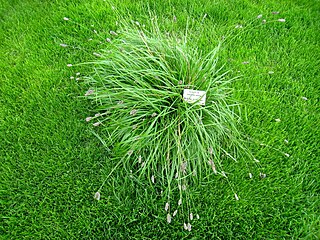
Sesleria heufleriana is a species of perennial grass in the family Poaceae, native to central, southeastern, and eastern Europe and the Caucasus. Culms are erect, ranging from 30–70 cm long; leaf-blades are conduplicate or convolute, and 20–35 cm long by 2–3 mm wide.

Elachista adscitella is a moth of the family Elachistidae found in Europe.
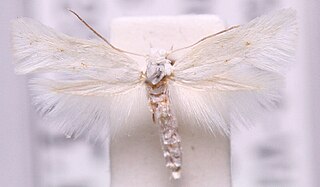
Elachista dimicatella is a moth of the family Elachistidae. It is found in the mountains from Germany and Poland to the Pyrenees, Italy and Romania.

Sesleria argentea is a species of perennial grass in the family Poaceae. It is 35–55 centimetres (14–22 in) long with a 0.5–1 millimetre (0.020–0.039 in) long ciliolate membrane. Its leaves are either conduplicate or convolute, and are 10–20 centimetres (3.9–7.9 in) long and 3–5 millimetres (0.12–0.20 in) wide. It also has a linear panicle spiciform which is 3.5–5.5 centimetres (1.4–2.2 in) long and 0.5–0.7 centimetres (0.20–0.28 in) wide.

Sesleria albicans is a species of perennial grass in the family Poaceae which can be found throughout Europe.
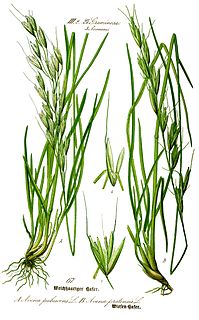
Avenula is a genus of Eurasian flowering plants in the grass family. Over 100 names have been proposed for species, subspecies, varieties, and other infraspecific taxa within Avenula, but only one species is accepted. The others names are all regarded as synonyms of other accepted names. The only recognized species in the genus is Avenula pubescens, commonly known as downy oat-grass or downy alpine oatgrass, native to Europe and Asia from Iceland and Portugal to Xinjiang, Mongolia, and Siberia. It is also naturalized in scattered locations in North America, in states as Connecticut, Delaware, Minnesota, New Jersey and Vermont, and in Canadian provinces such as Alberta, Manitoba, Ontario, Quebec, and Saskatchewan.

Sesleria insularis is a species of perennial grass in the family Poaceae, with culms 30–65 cm long.

Sesleria autumnalis, commonly known as autumn moor grass, is a species of grass within the family Poaceae. It is native to southeastern Europe and often used as ornamental ground cover in North America.



















